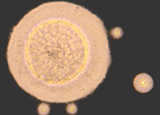Mycology

The department's mycology program has a major focus on Cryptococcus neoformans, a ubiquitous environmental microbe frequently affecting individuals with impaired immunity.
Fungi became major pathogens in the 20th century and are today major causes of mortality and morbidity, especially in individuals with impaired immunity. A major research area of the department is focused on understanding the ecology and pathogenesis of Cryptococcus neoformans. This ubiquitous environmental microbe frequently affects individuals with impaired immunity, causing lung infection, including a particularly dangerous fungal meningitis.
Lab of Arturo Casadevall, MD, PhD
Cryptococcus neoformans
The research program of the Casadevall laboratory seeks to elucidate host defenses against C. neoformans, and how the fungus’ virulence contributes to disease. One aspect of this research is C. neoformans melanin production and how it relates to virulence. Melanin, a pigment of undefined chemical structure and with a tremendous physical stability, accumulates in the cell wall of C. neoformans and enables growth and budding.
Melanin
The Casadevall laboratory is also interested in targeting melanin for the treatment of melanoma, a type of skin cancer, and in exploring the capacity of melanin in capturing electromagnetic radition, which may be used by fungi as a form of photosynthesis. Melanins are dark-colored pigments produced by animals, plants, fungi, and bacteria. These polymers serve diverse biological functions including radioprotection, immune defense, thermoregulation, and energy transduction. At the Casadevall lab, our melanin studies cover basic to applied sciences. We are interested in elucidating the process of melanogenesis in Cryptococcus neoformans, where melanin plays a key role during infection. In addition, we study the melanin-based immune system of insects, particularly in the malaria-transmitting mosquito Anopheles gambiae, and the Wax Moth Galleria mellonella. We also study the role of fungal melanin in thermoregulation.
